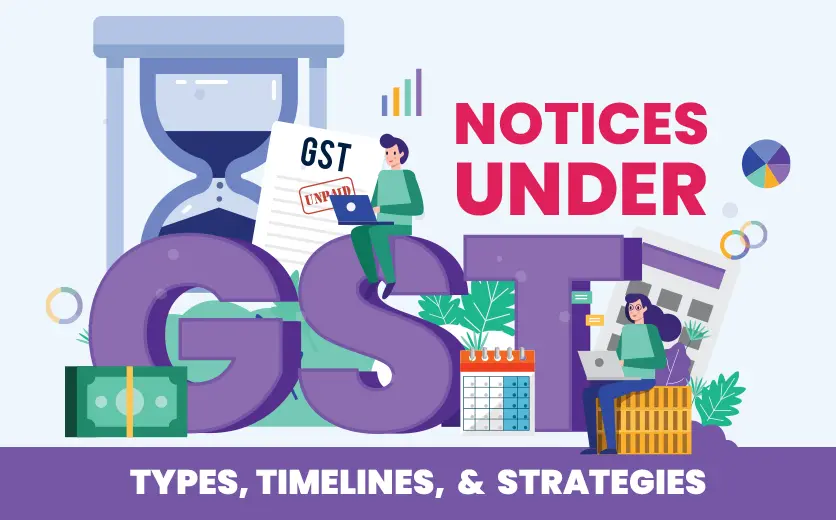
Notices Under GST: Types, Timelines, and Strategies
The Goods and Services Tax (GST) revolutionized the Indian taxation system, introducing simplicity and uniformity. However, within this streamlined framework, notices under GST remain crucial elements that businesses must handle with care.
This comprehensive guide unravels the complexities of GST notices, exploring their nature, diverse types, common triggers, the importance of prompt response, the consequences of negligence, proactive avoidance strategies, and the far-reaching impact these notices can have on businesses.
Table of Contents
What are GST Notices?
GST notices are formal documents sent by tax authorities to businesses to address discrepancies, seek explanations, or launch investigations. These notices are crucial for maintaining transparency, upholding GST law compliance, and resolving issues swiftly.
Types of Notices under GST
The different types of notices under GST are mentioned below:
Show Cause Notices
Show Cause Notices under GST are formal warnings issued by tax authorities when they believe a business has violated GST laws. These notices require the taxpayer to explain within a specific timeframe.
Demand Notices
These notices inform businesses about unpaid taxes and the reasons for the demand.
Return-related Notices
These notices are issued to address discrepancies or non-compliance in GST return filings. They may request additional information, corrections, or clarifications.
Audit-related Notices
These notices arise from tax audits and require businesses to provide documentation and explanations related to financial transactions and compliance.
Here we have mentioned below in the table a few more types of notices under GST, which is important to know.
| Notice | Description | Action Required | Time Limit | Consequence of Non-Response |
|---|---|---|---|---|
| GSTR-3A | Default notice to non-filers of GST returns | File the required GST returns | 15 days from the date of receiving the notice | Assessment of tax based on best judgment and penalties |
| CMP-05< | Show cause notice – Questioning the eligibility to be a composition dealer | Justify why taxpayers should continue to be eligible for the composition scheme | 15 days of receipt of the notice | Penalty and denial of composition scheme benefits |
| REG-03 | Notice for clarification of information provided in the application for GST registration or amendment of GST registration | Provide clarification or information | Within 7 working days from the date of receiving the notice | Rejection of application and electronic notification in REG-05 |
| REG-17 | Show cause notice for cancellation of GST registration | Provide reasons for non-cancellation of GST registration | Within 7 working days from the date of receiving the notice | Cancellation of GST registration in REG-19 |
| REG-23 | Show cause notice for revocation of cancellation of GST registration | Provide reasons for revocation of cancellation | Within 7 working days from the date of receiving the notice | Revocation of cancellation of GST registration |
| REG-27 | Notice for non-application after obtaining provisional registration or providing incorrect details | Apply in REG-26 and appear before the tax authority | None prescribed | Cancellation of provisional registration in REG-28 |
| PCT-03 | Show cause notice for misconduct by the GST practitioner | Reply within the prescribed time | Within the prescribed time | Cancellation of license as GST practitioner |
| RFD-08 | Show cause notice for denial of GST refund | Reply letter with justification | Within 15 days of receipt of notice | Rejection of GST refund application |
| ASMT-02 | Notice for seeking additional information for provisional assessment | Reply with documents | Within 15 days from the date of service of the notice | Rejection of application for provisional assessment |
| ASMT-06 | Notice for seeking additional information for final assessment | Reply with information | Within 15 days from the date of receipt of the notice | Issuance of ASMT-07 without considering taxpayer’s views |
| ASMT-10 | Scrutiny notice for discrepancies in GST return | Reply with reasons for discrepancies | Within the prescribed time or a maximum of 30 days | Assessment based on available information; may lead to prosecution and penalty |
| ASMT-14 | Show cause notice for assessment under section 63 | Reply in writing and appear before GST authority | Within 15 days of notice | Assessment order in ASMT-15, may not be favorable to assessee |
| ADT-01 | Notice for conducting audit by tax authority under section 65 | Attend in person or produce records | Within the prescribed time | Presumption of not possessing books of accounts and initiation of proceedings |
| RVN-01 | Notice under section 108 for revision of order of appeals | Reply within the prescribed time and/or appear before GST authority | Within 7 working days from the date of service of the notice | Ex parte decision based on available records and merits |
| Notice of Enquiry by Directorate of Anti-profiteering | Cooperate in proceedings and provide evidence | As may be specified in the notice | Ex parte proceedings based on available evidence | |
| DRC-01 | Show cause notice for demand of tax paid shortly or not paid | Reply with payment of demanded tax, interest, and penalty within | n 30 days of receipt of the notice order | r with higher penalty or prosecution within three years from the due date of annual returns-DRC |
| C-10 and DRC-17 | Notice of Auction of Goods | Pay the outstanding demands | s may be specified in the notice before the sale | E-auction and sale |
| DRC-11 | Notice to the successful bidder pays | y the full bid amount within | n 15 days from the date of the auction | e-auction DRC |
| C-13 | Notice of Recovery of outstanding tax from a third person deposit | t the specified amount and reply not | t applicable | Deemed defaulter and subject to prosecution and penalties-DRC |
| C-16 | Notice for attachment and sale of immovable/movable goods/shares | Prohibited from transferring or creating a charge on the said goods | Not applicable< | Prosecution and/or penalties |
If you are interested in learning GST-related articles then visit here:
GST Unveiled: Explore a Range of Courses for In-Depth LearningFrom Basics to Advanced: Expert-Driven GST Learning Programs |
|
| Browse Classroom Course | Browse Online Course |
| More Learning Options for you: GST Certification Course | TallyPrime with GST and TDS | GST & TDS |
|
Common Reasons for GST Notices
- Incorrect Filings
GST return filing errors, such as inaccurate reporting of transactions, miscalculations, or late filings, frequently lead to the issuance of GST notices. - Non-Payment of Taxes
Businesses that fail to pay the GST taxes they collect to the government may receive demand notices, which outline unpaid taxes, penalties, and interest charges. - Mismatch in Input-Output Tax Credit
Inconsistent Input Tax Credit (ITC) claims and reporting in GST returns may trigger notices, necessitating reconciliation. - Tax Audit Findings
Tax audits may uncover discrepancies, leading to audit-related notices requesting further documentation and explanations.
Looking to read more about GST. Check out related articles here
Reply to GST Notices: Importance and Considerations
- Timely Action: Delaying responses to GST notices can lead to increased penalties and legal complications.
Understanding the Notice: Thoroughly review the notice to pinpoint the exact concerns, deadlines, and required information or actions - Consulting Professionals: In situations of complexity, engage tax specialists or legal advisors to provide guidance on suitable responses and uphold accuracy
- Gathering Documentation: Accumulate relevant supporting documentation, including invoices and financial statements, to provide evidence for your responses. Well-documented replies facilitate a smoother resolution process.
- Crafting a Clear Response: Develop a clear and concise response, addressing each point systematically with accurate information and any necessary clarifications.
Consequences of Non-Compliance
- Accumulation of Penalties: Neglecting to respond can lead to mounting penalties and interest, escalating over time.
- Legal Consequences: Repeated violations of compliance standards can escalate to legal proceedings, potentially culminating in prosecution and a marked decline in a business’s operational efficiency.
- Business Disruption: Legal actions and financial penalties can throw a wrench into business operations, restrict cash flow, and hinder the seamless execution of daily business activities.
- Damage to Reputation: Non-compliance with regulations and legal troubles can cast a shadow over a business’s reputation, potentially damaging its relationships with stakeholders.
Proactive Measures to Avoid Notices
- Regular Compliance Audits
Adopt a regular internal audit schedule to verify the accuracy and timeliness of GST return filings, thus minimizing the probability of receiving notices - Implementation of Automation
Integrate automated GST compliance solutions to reduce errors, enhance accuracy, streamline processes, and reduce discrepancies. - Stay Informed
Regularly update knowledge of GST regulations and compliance requirements to maintain awareness and adherence.
Read more about GST here
Conclusion
Dealing with different notices under GST demands alertness, comprehension, and proactive compliance from businesses. Instead of being just government paperwork, these GST notices offer chances to fix errors, boost compliance, and build clear ties with tax authorities.
Through proactive steps, staying informed, and responding to notices quickly, businesses can lower risks, maintain compliance, and navigate the ever-changing GST landscape successfully.
- Understanding Credit Notes in Tally Prime: A Comprehensive Guide - April 26, 2024
- 50+ SAP MM Interview Questions and Answers Revealed - April 19, 2024
- Tally Prime on Mobile: Revolutionizing Business Management On-The-Go - April 5, 2024





